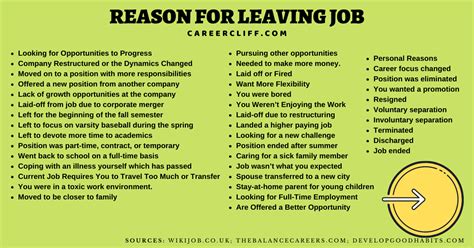Expert Tips: Explaining Reasons For Leaving A Job

Leaving a job can be a difficult decision to make, and it’s important to explain your reasons for leaving in a clear and professional manner. Whether you’re leaving due to a better job opportunity, personal reasons, or dissatisfaction with your current role, it’s essential to handle the situation professionally to maintain your reputation and future job prospects. In this post, we’ll provide expert tips on how to explain your reasons for leaving a job.
1. Be Honest and Clear
When explaining your reasons for leaving a job, it’s important to be honest and clear. If you’re leaving for personal reasons, it’s okay to mention that without going into too much detail. If you’re leaving for a better job opportunity, explain why the new job is a better fit for your career goals and aspirations. Being honest and clear will help you maintain your professional reputation and avoid any misunderstandings.
2. Be Positive
When explaining your reasons for leaving a job, it’s important to remain positive. Avoid criticizing your current or former employer, coworkers, or job duties. Instead, focus on the positive aspects of your experience and what you’ve learned. This will help you maintain a positive relationship with your former employer and coworkers, which can be beneficial for future job opportunities.
3. Focus on the Future
When explaining your reasons for leaving a job, it’s important to focus on the future. Explain how your decision to leave is part of your career goals and aspirations. Highlight what you’re looking for in your next job and how you plan to achieve your professional goals. This will show that you’re proactive and focused on your career growth.
4. Practice Your Explanation
Before you explain your reasons for leaving a job to your current or former employer, practice your explanation. Write down your reasons and practice saying them out loud. This will help you feel more confident and prepared when the time comes to explain your decision.
5. Keep it Brief
When explaining your reasons for leaving a job, it’s important to keep it brief. Avoid going into too much detail or getting emotional. Stick to the facts and keep your explanation professional. This will help you maintain your reputation and avoid any misunderstandings.
6. Offer to Help
When explaining your reasons for leaving a job, it’s important to offer to help. This can include training your replacement, finishing any outstanding projects, or assisting with the transition process. Offering to help will show that you’re a team player and maintain a positive relationship with your former employer and coworkers.
7. Follow Up
After you’ve explained your reasons for leaving a job, it’s important to follow up. This can include sending a thank-you email to your former employer and coworkers, staying in touch with your former colleagues, or offering to provide references. Following up will show that you’re professional and maintain a positive relationship with your former employer and coworkers.
8. Seek Feedback
When explaining your reasons for leaving a job, it’s important to seek feedback. Ask your former employer and coworkers for feedback on your performance and how you can improve. This will help you grow professionally and improve your job prospects in the future.
9. Remain Professional
When explaining your reasons for leaving a job, it’s important to remain professional. Avoid getting emotional or burning bridges with your former employer and coworkers. Remember that your reputation is important and that you may need references or recommendations in the future.
10. Be Prepared for Questions
When explaining your reasons for leaving a job, be prepared for questions. Your current or former employer may ask why you’re leaving, what you’re looking for in your next job, or how they can improve. Be prepared to answer these questions in a professional and honest manner.
Conclusion
Explaining your reasons for leaving a job can be a challenging task, but it’s important to handle the situation professionally. By being honest, positive, and focused on the future, you can maintain your reputation and future job prospects. Remember to practice your explanation, keep it brief, and offer to help. Seek feedback, remain professional, and be prepared for questions. By following these expert tips, you can explain your reasons for leaving a job with confidence and professionalism.
FAQs
Q: Should I tell my current employer that I’m looking for a new job?
A: It’s generally not recommended to tell your current employer that you’re looking for a new job until you’ve accepted a job offer. This can create tension in the workplace and may lead to negative consequences.
Q: What should I do if my current employer asks me to stay?
A: If your current employer asks you to stay, it’s important to consider your options carefully. If you’re happy with your current job and feel that staying is the best option for your career goals and aspirations, you may decide to stay. However, if you’ve already made the decision to leave, it’s important to be honest and explain your reasons for leaving in a professional manner.
Q: How can I maintain a positive relationship with my former employer and coworkers?
A: To maintain a positive relationship with your former employer and coworkers, it’s important to remain professional and positive. Offer to help with the transition process, stay in touch with your former colleagues, and send a thank-you email. Avoid burning bridges or getting emotional.
